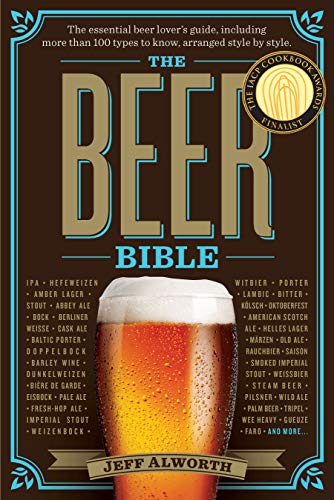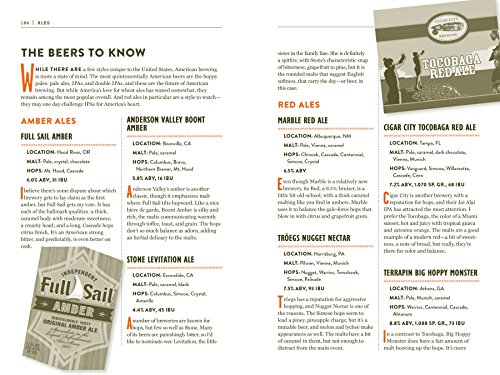تسليم إلى Morocco
Iللحصول على أفضل تجربة احصل على التطبيق
معلومات عنا
حقوق الطبع والنشر © 2024 Desertcart Holdings Limited





Full description not available
E**I
The complete encyclopedia for beer
It’s October, the unofficial month for beer, and I thought you know what will be cool to learn? How to make my own beer! And there’s arguably no better book to learn about this (and anything else about beer, for that matter) than one that is bold enough to claim to be its bible, with a whopping 657 pages of everything you need to know about beers, ales, wheat beers, lagers, tart and wild ales.And when I said everything, I mean everything. The bible tells us all, from different brewing methods, different styles, and regions that create different taste. It list all the ingredients for making different types of taste, and for how long and at what temperature we should brew them, and which glassware or aluminum can to use to store them, and so on. It covers key activities such as lautering, boiling, chilling, fermentation, filtering and packaging. And it teaches us ways to taste beer like an expert brewer, which includes the intriguing explanation of retronasal smell and the difference between flavour and taste.The book even trace back the history of beer to as far as 10,000 years ago. It’s really fascinating how many civilizations that presumably had no contact with each others can each separately develop techniques to create what later becomes beer. From Mesopotamia to Mayan to Egypt to China to Scotland and Scandinavia, where at one point after the birth of Jesus Christ and the rise of Christianity, monasteries once became centers of brewing activities.Charmingly, the book also provides the explanation to many drinking games and how to say cheers in many different languages. It lists all the beer festivals happening around the world. And if we want to go for a “beer tourism”, aka visiting breweries, the book provides the proper route, explanations, and links to the recommended places.Of course the book would not be complete if it doesn’t provide the names and labels that the author, Jeff Alworth, think as the best of the best beers. And the long list is mighty specific, spread across many different location in the world, covering many local breweries (none of those mass-produced brand names), which includes their ingredients, methods of brewing (what the hell is a stream beer?), and their backstories (such as why Indian beers ended up using more hops). And to be fair Alworth also tells the fascinating stories of the biggest brand names in the world and how they got so big and why they each taste the way they uniquely taste.And just in case you somehow skip the early pages and only start reading from the middle, note that “Michael Jackson” is a respectful and legendary writer in the industry, and no you’re not drunk for thinking that THAT Michael Jackson is secretly a beer expert (it’s not he-he-em).
T**Y
Beer Bible Lives Up To Its Name
Perhaps no other word in the English language is as used and abused as the word “bible.” The Bible is, of course, the book, the granddaddy of them all, the book of books, ground zero for storytelling. So it’s no surprise that contemporary authors would tap into that universal vibe, hoping to ride the bible wave. On Amazon there are books called The Freelancer’s Bible, The Screenwriter’s Bible, the Medical Marijuana Grower’s Bible, the Colored Pencil Painting Bible—there’s even a book called the LSAT Logic Games Bible, which is a stretch even by LSAT standards. There is, of course, The Wine Bible. All these books use descriptors like “everything” and “complete” and anything else that derives foundational juju from that archetypal tome. And now Jeff Alworth has given us The Beer Bible.Alworth is a beer writer and author of The Beer Tasting Toolkit and Cider Made Simple, and he has his own blog, Beervana. In addition, he writes a weekly column for All About Beer, and co-hosts the quirky and entertaining podcast—also called Beervana—with Patrick Emerson. Alworth has mash tuns of information to share, and it’s quickly evident that he does his research the old fashioned way: at the pub.That is not a snarky indictment of his writing. To the contrary, The Beer Bible is filled with concise and clear language that only occasionally leaves the hopped neophyte bewildered. There’s enough tech talk in here to satisfy more advanced brewfans, but the majority of the book is accessible to the lay readership.The Beer Bible is organized into major categories that can be read apart from the rest of the book: ales, wheat beers, lagers, and tarts and wild ales. Early on Alworth tackles the tricky territory of beer styles, or types. Other livening beverages have a distinct sense of place—terroir. Wine and whiskey reflect the regions of their production. But beer is different. Beer reflects history and economics, evolution and culture, place and time. And this is where Alworth shines. He makes sense of the complexities of beer geography without bogging down in minutiae better left to academic study. Here’s an example of his storytelling that allows access into the complexities of the beer world:If you were to devise a product equally as attractive to beer geeks as oenophiles, it would look a great deal like the “Burgundies of Belgium”…Once there were dozens of these regional specialties and it made sense to differentiate between schools known as Flemish red and brown beers. Now…their differences are far less significant than their similarities.Can’t beer lovers get a cool name like wine lovers? How about beeroisseurs? Or cervisiphiles? Anyway, that’s just an example of how this book handles what can be a confusing roadmap of understanding beer. Another way is the layout. Each section contains interesting sidebars, statistics, characteristics, brewing notes, a great “Beers to Know” section featuring a cross-section of examples, and a short feature on a notable brewer or brewery. Add to that a section called “Knowing Beer” and a section called “Enjoying Beer,” and The Beer Bible justifies its name.The other joy of this book is the sense of place that the author imparts. We feel like we are right there with him, whether he is groggily making his way through a German bierstube, or drawing information from one of Italy’s great brewmasters. He does this without abusing the first person, inserting himself only as seasoning to amplify the story.If the Bible itself was God’s word, or if it is just a compilation of where we were thousands of years ago, it serves as a good template for Jeff Alworth’s better-tasting version. This is a complete, entertaining read that serves as both a handbook and a story. You’ll find yourself reaching for this book again and again as you reach for more and different beers, and neither of those things is bad.
A**I
Great!
If you are into beer - it’s your bible. I am learning beer for couple years and this book helped me to understand some things the brewers were not able to explain to me. Just the first 10 pages are already very useful. It’s also a great book for people who just like beer. Get a pint and read the book :)
L**O
Most comprehensive and current beer book today!
I’ve long enjoyed Jeff Alworth’s writings on his Beervana blog, in “All About Beer” magazine and elsewhere. While I eagerly anticipated publication of “The Beer Bible,” it’s even more impressive than I’d imagined.I recommend the print version; you’ll most likely want to mark up this reference book and dog-ear pages. I’ve spent quite a few hours over the last month reading it off and on and digesting the encyclopedic information. Before I finished Part One, “Knowing Beer,” I skipped to “Beer Tourism” in Part Six. Jumping around work fine, perhaps even better than trying to read straight through this 644-page tome.Alworth arranges the beer descriptions by style—ales, wheat beers, lagers, tart and wild ales. His history of each style gives the reader a grounded perspective of how the style came to its current version. He suggests 5-8 specific beers to try in a style, listing information and mentioning the strongest points of each. With some styles, I’ve read right through. For others, I’ve had fun reading portions and sharing information with my husband about the particular beer we’re drinking.A beer bible could easily become a rote and boring list of information, but Alworth is too good of a writer to fall into that trap. The book is chock full of photos and side bars with interesting tidbits of information. I don’t know of any other book on beer that is so current, comprehensive and well written.
I**A
Super great!
When we were in Belgium, my boyfriend really liked this one "Beer Bible" book. I couldn't find the exact one so got him this. But he loves it and I think it's great. It's got beers from all over the world, tells you about the differences, the process of making it. Super educational and we love that it doesn't focus on one region only!
F**T
Ale and Arty
Bought as a present but seems to have gone down almost as well as the beer he consumes. Full of fascinating stuff to read while you sample the recommendations.
R**N
Well written and researched
I hadn't realised this was American and some items are USA specific. However there is a lot to interest the UK reader and it is a well produced and high quality paperback, well worth the money.
C**N
Información que cruda...
Ufff es un libro muy extenso con muchos datos que desconocía acerca de la cerveza en genera, me llevara meses disfrutarlo todo, lo único que me hubiera gustado es que incluyera tópicos de la cerveza en América Latina, pero es un tema tan extenso que sería un libro nada mas para eso
C**N
No existe libro más actual y completo sobre cerveza!
Lo recomiendo encarecidamente, a pesar de estar escrito por una eminencia en EEUU, no se limita a poner énfasis en los modernos estilos del craft beer americano. Aborda todos los estilos de cerveza de una manera amena y muy muy didáctica, incluso para personas recién iniciadas en esta fantástica bebida. El precio, teniendo en cuenta el número de páginas, es más que barato! No lo dudes!
ترست بايلوت
منذ 4 أيام
منذ يومين